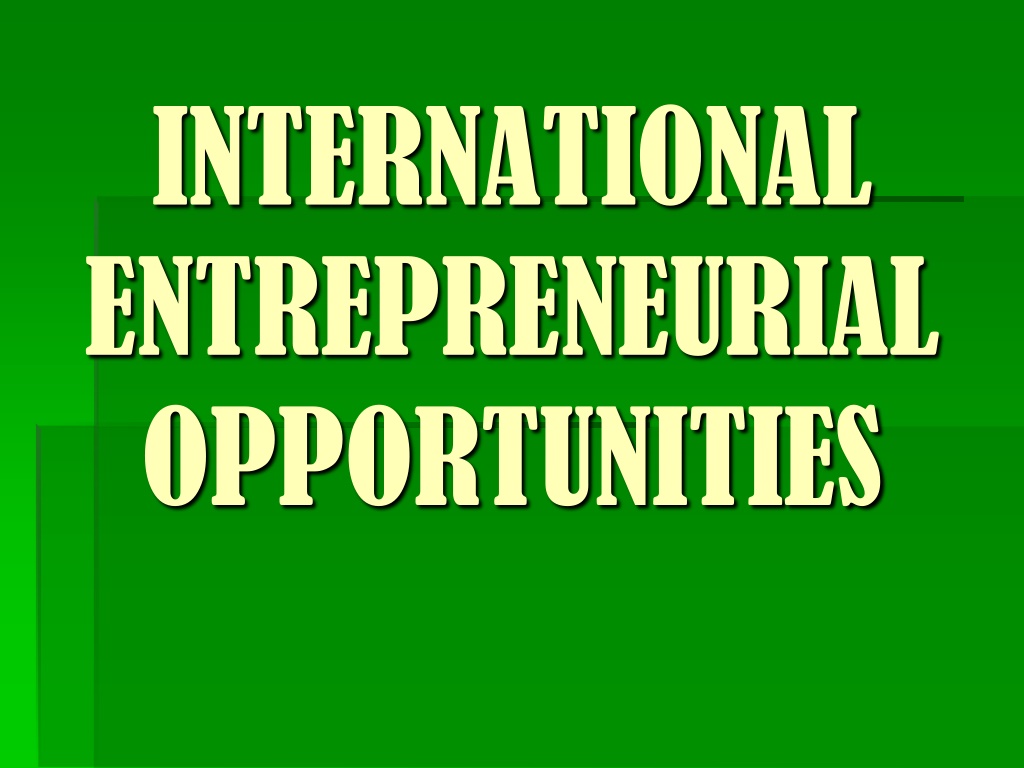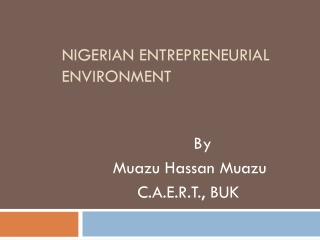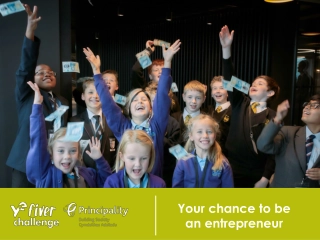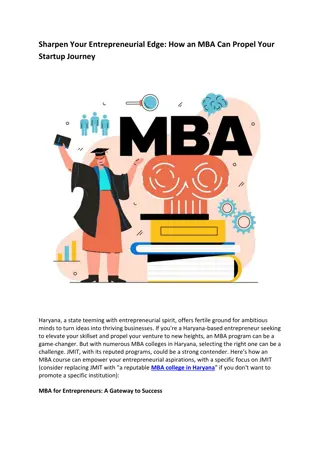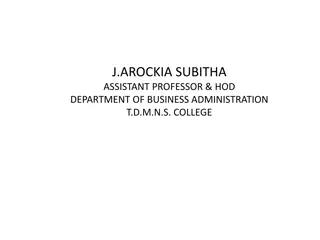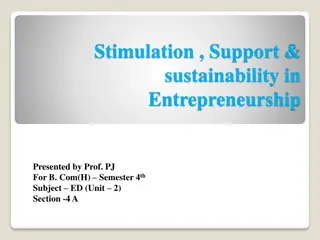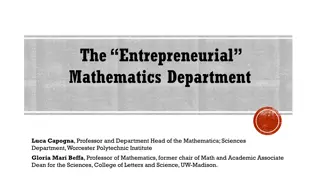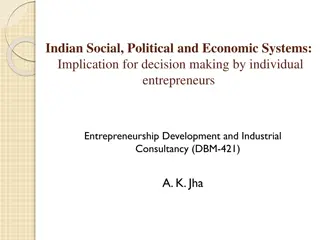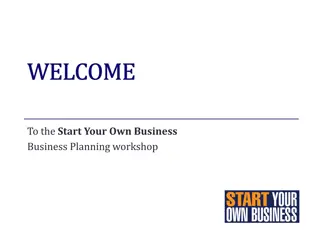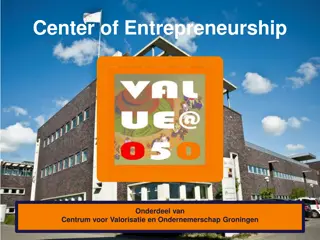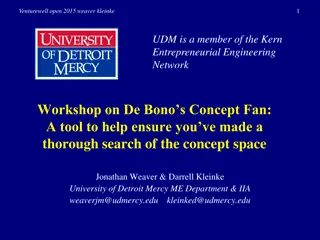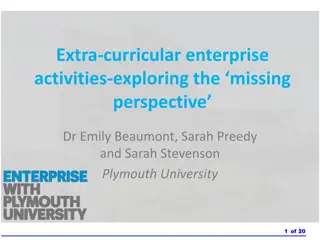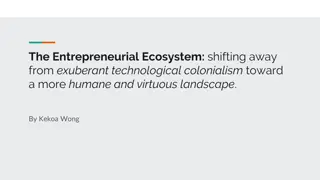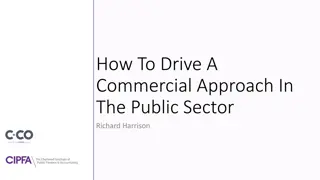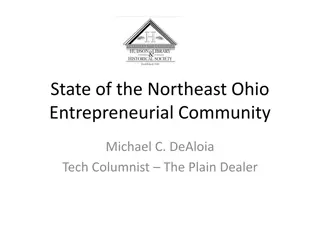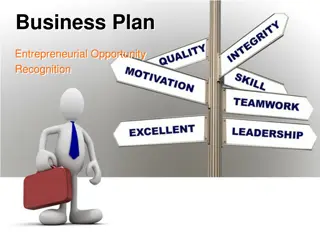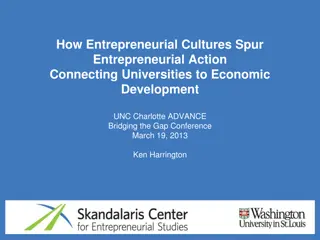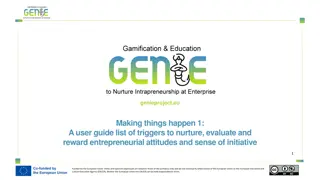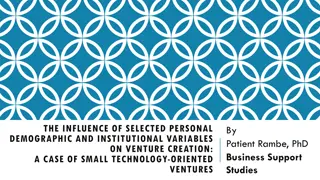INTERNATIONAL ENTREPRENEURIAL OPPORTUNITIES
Explore the theory of opportunity discovery, types of opportunities, the opportunity matrix, and sources of entrepreneurial opportunities. Discover how personal characteristics, trigger events, and social networks play a role in creating and identifying opportunities.
Download Presentation

Please find below an Image/Link to download the presentation.
The content on the website is provided AS IS for your information and personal use only. It may not be sold, licensed, or shared on other websites without obtaining consent from the author.If you encounter any issues during the download, it is possible that the publisher has removed the file from their server.
You are allowed to download the files provided on this website for personal or commercial use, subject to the condition that they are used lawfully. All files are the property of their respective owners.
The content on the website is provided AS IS for your information and personal use only. It may not be sold, licensed, or shared on other websites without obtaining consent from the author.
E N D
Presentation Transcript
INTERNATIONAL ENTREPRENEURIAL OPPORTUNITIES
Catalyst Personal Characteristics Trigger Events Push Dissatisfaction Job loss Migration No sponsor Responsibility Pull Prestige Wealth Peer pressure Resources Opportunity Entrepreneurial Process Idea Generation Evaluation Business Planning Resource Mobilization Implementation Discovery or Creation of Entrepreneurial Opportunities Catalysts Social Networks Parents Family Role models Organizational Environmental Team Strategy Structure Culture Customers Suppliers Govt. Policy Financing
Opportunities Opportunities An opportunity has four essential qualities. It is Attractive, Timely, Durable, and Anchored in a product, service, or business that creates or adds value for its buyer or end user Opportunity Discovery Theory Opportunity Creation Theory
Types of Opportunities Types of Opportunities Perennial Occasional Cheaper, quicker, higher, quality, more reliable, incrementally better Supply withdrawn, demand surge, new market segment, market holes Multiple Cause More elderly with more income and more time on their hands Multiple Effect Increased longevity creates need for , domestic terrorism creates need for ,
The opportunity Matrix The opportunity Matrix REVENUE POTENTIAL BIG SMALL Highly Competitive Most small Small Business Enterprises The Black Holes Known Concept HIGH Novel Concept POTENTIAL VENTURES
Discovery theory Discovery theory Suggests that information improves market understanding and decision- making and helps to: correctly differentiate between high- and low-potential opportunities, perceive hidden benefits and risks overcome challenges associated with newness and information dissemination. Reduce uncertainties and the chances of failure.
Opportunity Sources Opportunity Sources ( (Drucker Drucker, P. F, 1985) , P. F, 1985) The Unexpected Success, Failure or Unexpected Events. Incongruities - discrepancies between what is and what was expected. are a sign of change that has occurred, and therefore a sign of opportunity. Process Needs Changing Industry & Market Structure Demographics - changes in population size, age structure, composition, employment, educational status, and income. Changes in Perceptions: New Knowledge:
Why we cant see Why we can t see All or nothing thinking If I m not perfect I have failed Either I do it right or not at all Mental filter Only paying attention to certain types of evidence. Jumping to conclusions Noticing our failures but not seeing our successes Overgeneralising Everything is always rubbish , Nothing good ever happens , Ugandans are cheats Disqualifying the positive Magnification (catastrophising) & minimisation Compulsorising Internal or External Locus of Control
Addressing Opportunity Conventional Thinking a b Entrepreneurial Thinking a B*
Opportunity Opportunity Creation Creation
Innovators I will change the way things are to suit me Adaptors I will change to suit the way things are
Creativity is: Creativity is: A bility to generate ideas, to look at the ordinary and see the extraordinary. to cast a situation or challenge or problem in a new light and thereby open up the possibilities in it that were not evident before . to look at the ordinary and see the extraordinary. A process of removing old perception that leads to new awareness of reality, of continually improving by refining the existing regime of divergent thinking in search of opportunities. of expanding possibilities A n A ttitude that accepts change, and is willing to play with ideas and possibilities, and always seeking to improve. A bility A process A n A ttitude
Some Theories of Creativity Grace - creativity is a divine gift, and creative people are geniuses endowed with superhuman potential. Accident - the opposite of grace. Creativity arises by chance. Personality - Creativity is a natural extension of people's personality, and require an innate ability. Association creativity results from applying procedures from one area to another, and underlies the justification for many creative thinking techniques. Cognitive theory - creativity depends on cognitive abilities, such as intelligence, thinking and processing information. The Whole Brain Model - creative ideas emerge from the application of the whole brain.
Creative Methods Evolution. New ideas obtained from existing ideas through slight alterations and modifications. Synthesis ( or combinational creativity). Two or more existing ideas that may be entirely different and seemingly unrelated are combined together to generate a new idea that is substantially different from the original ideas. Revolution ( or transformational creativity). New ideas are a completely departure from the existing mode of thinking; providing a completely new way of thinking that is seemingly unconnected to the conventional thinking. Reapplication. Old ideas are brought into the current situation, and are used to generate new ideas. Changing Direction. Shifting attention from one angle of a problem to another. Exploring the possibility of another solution path when one solution path is not working.
Creative Thinking Critical Thinking Creative Thinking Analyses existing ideas Generates new ideas Converges on probable solutions Diverges to new possibilities Vertical Lateral Probability is emphasized Possibilities are emphasized Judgmental Suspended judgment Focused - on the probable Diffuse multiples possibilities Objective Subjective individuals views Explicit expressed in words Tacit can only be visualised
Some Creative thinking Some Creative thinking Techniques Techniques Brainstorming Best known and most powerful techniques for creative thinking aiming to: to break us out of our habit-bound thinking and to produce a set of ideas from which we can choose. Idea Generating Questions The Journalistic Six Who?What?When?Where?Why? & How? Historical Examination Essence.Origin.Purpose.Import.Reputation. Assumption Smashing What if Attribute Analysis. Breaks down a problem, idea, or thing into component parts and thinking about the parts rather than the whole.
Some Creative thinking Some Creative thinking Techniques Techniques Morphological Analysis. Builds upon attribute analysis by generating alternatives for each attribute to produce new possibilities. Manipulative Verbs. Uses a large list of action verbs to stimulate creative thinking Problem Reversal Forced Analogy. compares the unfamiliar or problematic with something familiar and understandable. Metaphorical thinking. A metaphor is a comparison between two unlike things, in which one thing is identified with the other. Trigger Concepts. A trigger concept (or idea seed or random seed) is an idea creating technique operated by bringing an unrelated idea into the problem and forcing connections or similarities between the two.
Two sides of culture Constructive cultures reward proactive behaviors that foster innovation, performance, and personal responsibility and accountability. Defensive cultures, reward inactive or reactive behaviors that focus on maintaining the status quo. They blame others for creating problems because of an innate real desire to look good on the surface.
Promoting Promoting Creative Behavior that is rewarded will be repeated Risk taking -- willingness to accept failure, success does not come without failure Accepting a trial and error approach, and using brainstorming sessions to generate new ideas Empowerment -- giving employees the freedom to make decisions increases the flexibility of the firm, improves customer response time, and increases product innovation Creative Behavior Behavior
